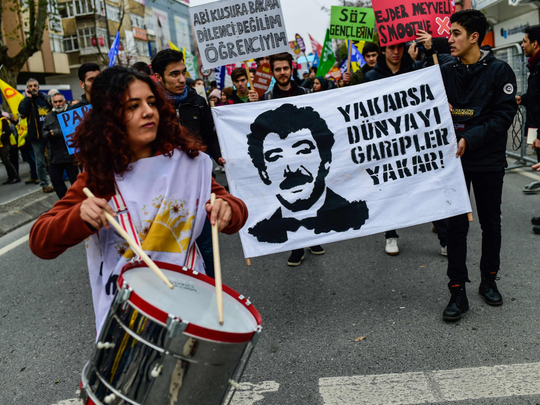
Ankara: Turkey’s economy lost some of its momentum in the third quarter as political uncertainty and heightened fear of US sanctions hurt a nascent recovery.
Gross domestic product expanded a seasonally adjusted 0.4 per cent from the previous three months, down from an expansion of 1 per cent during the April-to-June period, Turkstat said Monday. The median of eight forecasts in a Bloomberg survey was for an increase of 1.1 per cent. From a year earlier, GDP increased 0.9 per cent, making it the first annual expansion this year.
The quarterly slowdown was largely due to a drop in consumption growth. Household’s spending on purchases of goods and services, the biggest driver of Turkey’s economy, expanded 1.9 per cent from the previous quarter, down from a 3.4 per cent during the April-to-June period. Government consumption growth fell to 1.9 per cent from 2.2 per cent during the same period.
Monday’s GDP report shows policymakers still face an uphill battle as they try to boost an economy that exited a recession earlier this year following a currency crisis in 2018. Economic data such as factory output indicate the economy is back on a growth path, helped by central bank stimulus. But the prospect of US sanctions and political turmoil following municipal elections have weighed on consumer and business confidence.
“It’s all about confidence,” said Piotr Matys, a strategist at Rabobank in London. “As long as corporates remain reluctant to invest and households do not increase spending due to prevailing concerns that the lira could weaken again as reflected in the record high dollar deposits,” achieving the government’s growth targets will be a difficult task, he said.
Here are some highlights from the data:
The drama surrounding Turkey’s ties with the US has been keeping investors anxious since President Recep Tayyip Erdogan went ahead with plans to buy an advanced missile defence system from Russia. Erdogan’s personal rapport with President Donald Trump has so far spared Turkey from sanctions over the arms deal, but US lawmakers are likely to push for punitive action after Turkey began testing components of the Russian system last week.
Erdogan’s government dramatically increased its target for economic growth to 5 per cent for 2020-2022, after cutting this year’s forecast to 0.5 per cent.
In an attempt to promote growth, central bank Governor Murat Uysal has slashed Turkey’s benchmark interest rate by 1,000 basis points since his surprise appointment in July.
Whether that goal can be achieved hinges on the strength of the private sector, investment and exports, with the government relying on cheap credit to give the economy a shot in the arm.












